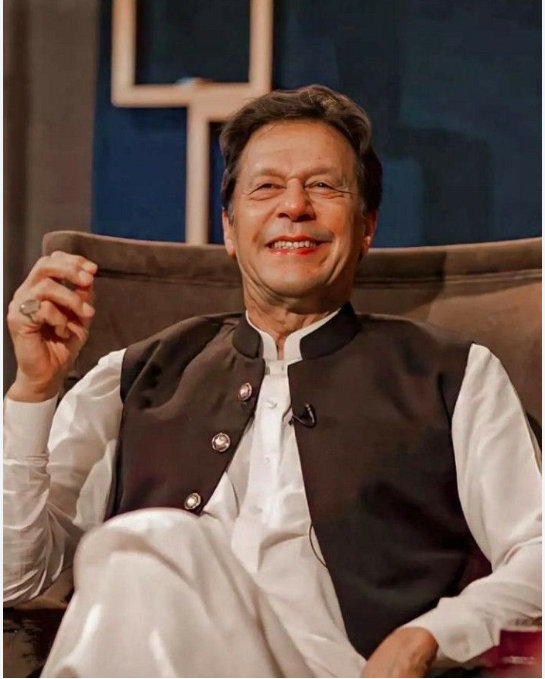Imran Khan, one of the most prominent figures in Pakistan’s modern history, is a name that resonates far beyond the realm of cricket or politics. His journey from being a national sports hero to the Prime Minister of Pakistan is a story marked by vision, resilience, and an unwavering belief in change. As both a sportsman and statesman, Imran Khan has left an undeniable impact on the hearts and minds of millions of Pakistanis.

Early Life and Cricketing Career
Born on October 5, 1952, in Lahore, Imran Ahmed Khan Niazi hailed from a well-off Pashtun family. He received his early education at Aitchison College, Lahore, and later moved to England where he studied at the prestigious Royal Grammar School in Worcester and then Keble College, Oxford. It was during his time in the UK that his cricketing talents truly flourished.
Imran Khan made his Test debut for Pakistan in 1971 at the age of 18. Over the next two decades, he rose to become one of the most successful and charismatic cricketers in the world. Known for his fierce fast bowling, strategic mind, and inspirational leadership, Khan’s defining moment came in 1992, when he led Pakistan to its first-ever Cricket World Cup victory. The win was not just a sporting triumph; it became a symbol of national pride and unity at a time when the country needed hope.
Philanthropy and Social Work
Following his retirement from cricket, Imran Khan could have comfortably chosen a life of luxury and fame. Instead, he turned to philanthropy. Motivated by the painful death of his mother from cancer, he built Pakistan’s first state-of-the-art cancer hospital – Shaukat Khanum Memorial Cancer Hospital & Research Centre – in Lahore in 1994. This was funded largely through public donations and remains one of the most respected medical institutions in the country.
He later founded Namal University in Mianwali, aiming to provide quality higher education in rural Pakistan. These initiatives showcased a new side of Imran Khan – a man driven by compassion, service, and reform.
Entry into Politics
In 1996, Imran Khan founded the political party Pakistan Tehreek-e-Insaf (PTI) – “Movement for Justice” – with the vision of establishing a welfare state based on the principles of justice, accountability, and Islamic welfare values. For many years, PTI struggled to gain a foothold in Pakistan’s traditional political landscape, dominated by dynastic parties like the Pakistan Peoples Party (PPP) and Pakistan Muslim League-Nawaz (PML-N).
Critics often labeled Khan as politically inexperienced and idealistic. Yet, his message of anti-corruption, justice, and national dignity continued to resonate, especially among the youth and urban middle class.
The Rise of PTI and Premiership
It was not until the 2013 general elections that PTI emerged as a significant political force, forming a government in Khyber Pakhtunkhwa province. Khan’s governance in KP focused on police reform, health, and education, which helped boost his image as a serious political leader.
In the 2018 general elections, PTI won a majority and formed the federal government, making Imran Khan the 22nd Prime Minister of Pakistan. His victory was seen as the rise of a “third force” in Pakistani politics, offering a break from decades of alternating rule by PPP and PML-N.
Challenges and Achievements as Prime Minister
As Prime Minister, Khan faced a mountain of challenges — from economic instability and rising inflation to foreign policy tensions and political opposition. His government launched the Ehsaas Program, Pakistan’s largest social safety net initiative, aimed at poverty reduction and financial inclusion. Khan also emphasized tourism, environmental sustainability (notably the Billion Tree Tsunami project), and the promotion of digital governance.
On the foreign policy front, Imran Khan worked to improve relations with neighboring countries and played a visible role in highlighting the Kashmir issue at international forums like the United Nations.
However, his tenure was also marred by economic difficulties, growing public dissatisfaction over inflation, and allegations of political victimization of opponents. In April 2022, Khan’s government was ousted through a vote of no-confidence in the National Assembly – making him the first Prime Minister in Pakistan’s history to be removed in this way.
Legacy and Ongoing Influence
Despite his removal from office, Imran Khan’s political journey is far from over. His narrative of “Haqeeqi Azadi” (True Freedom) has taken on a life of its own, sparking mass protests, rallies, and intense public engagement. He continues to command significant support across Pakistan, especially among the youth, who see him as a symbol of change, resistance, and hope.
Khan has also faced legal challenges and controversies post-premiership, but he remains a central figure in Pakistani politics. Whether one supports or opposes him, there is no denying that he has transformed the country’s political culture — bringing in a new style of campaigning, governance, and public discourse.
Conclusion
Imran Khan’s journey from cricket stardom to political leadership reflects a rare combination of charisma, conviction, and commitment. While his political legacy remains a subject of debate, his influence on Pakistan’s national identity, civic engagement, and international image is lasting. A leader who dared to dream, Imran Khan has proven that transformation is possible — even in the face of overwhelming odds.
Leave a Reply